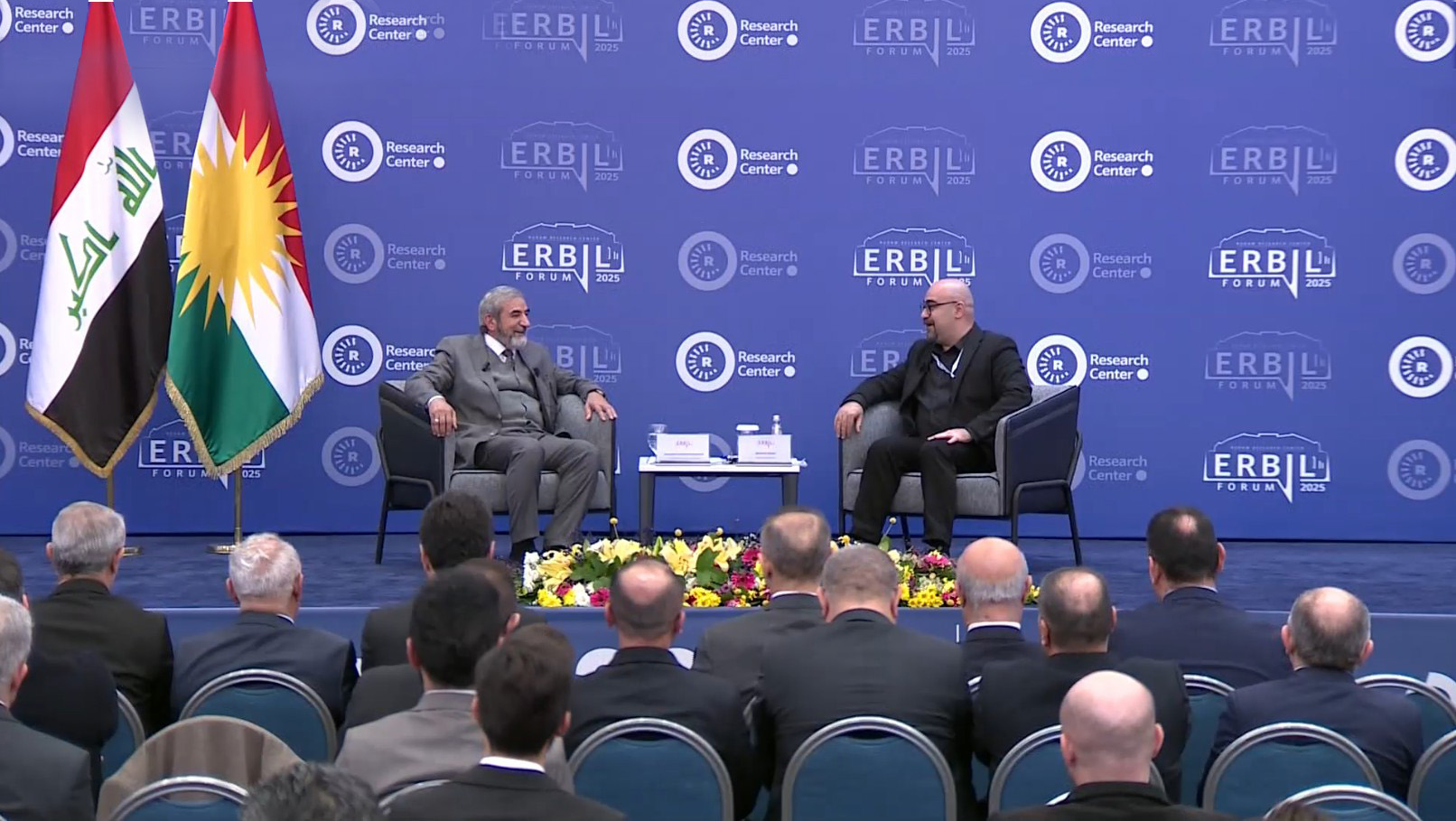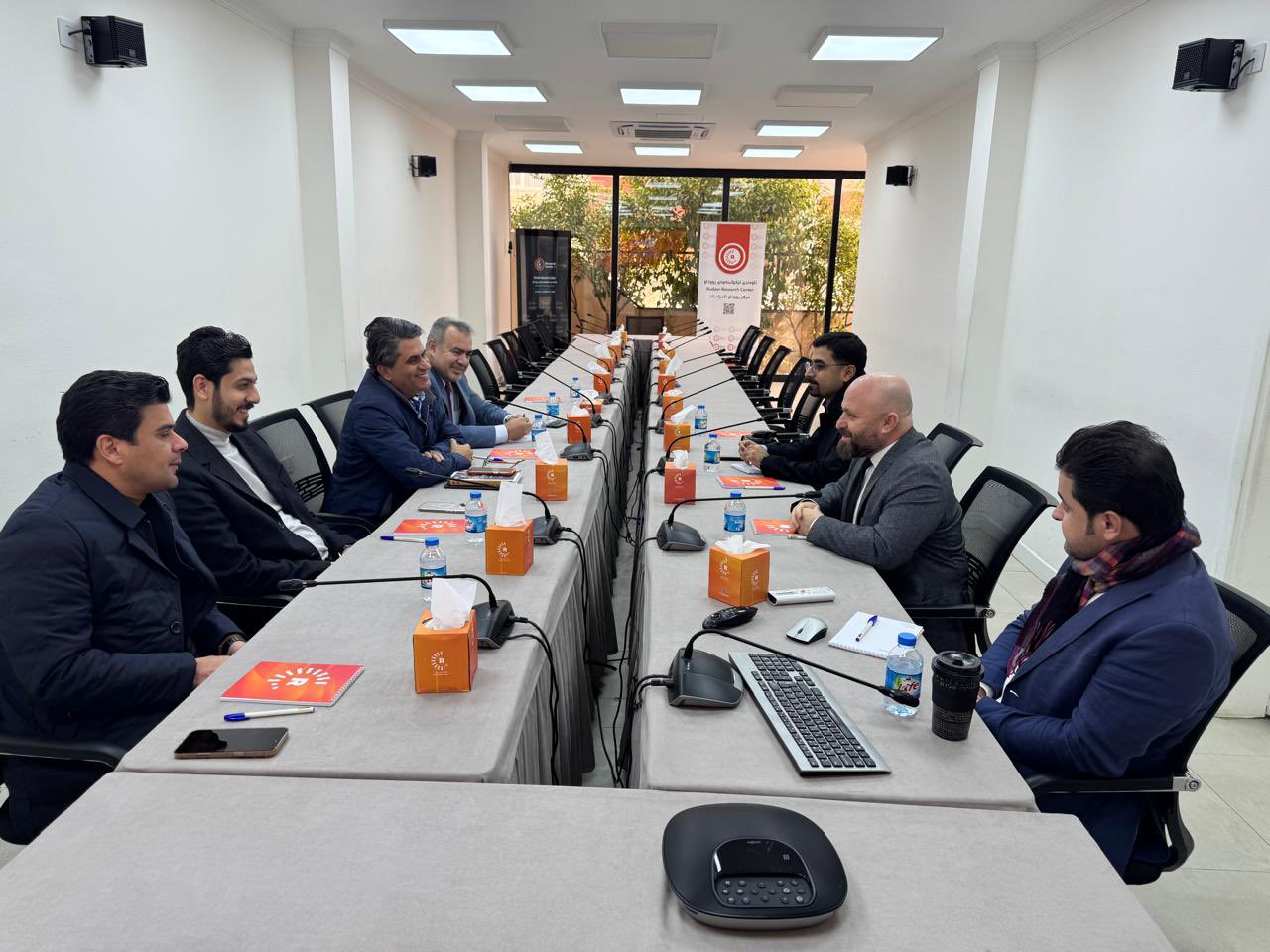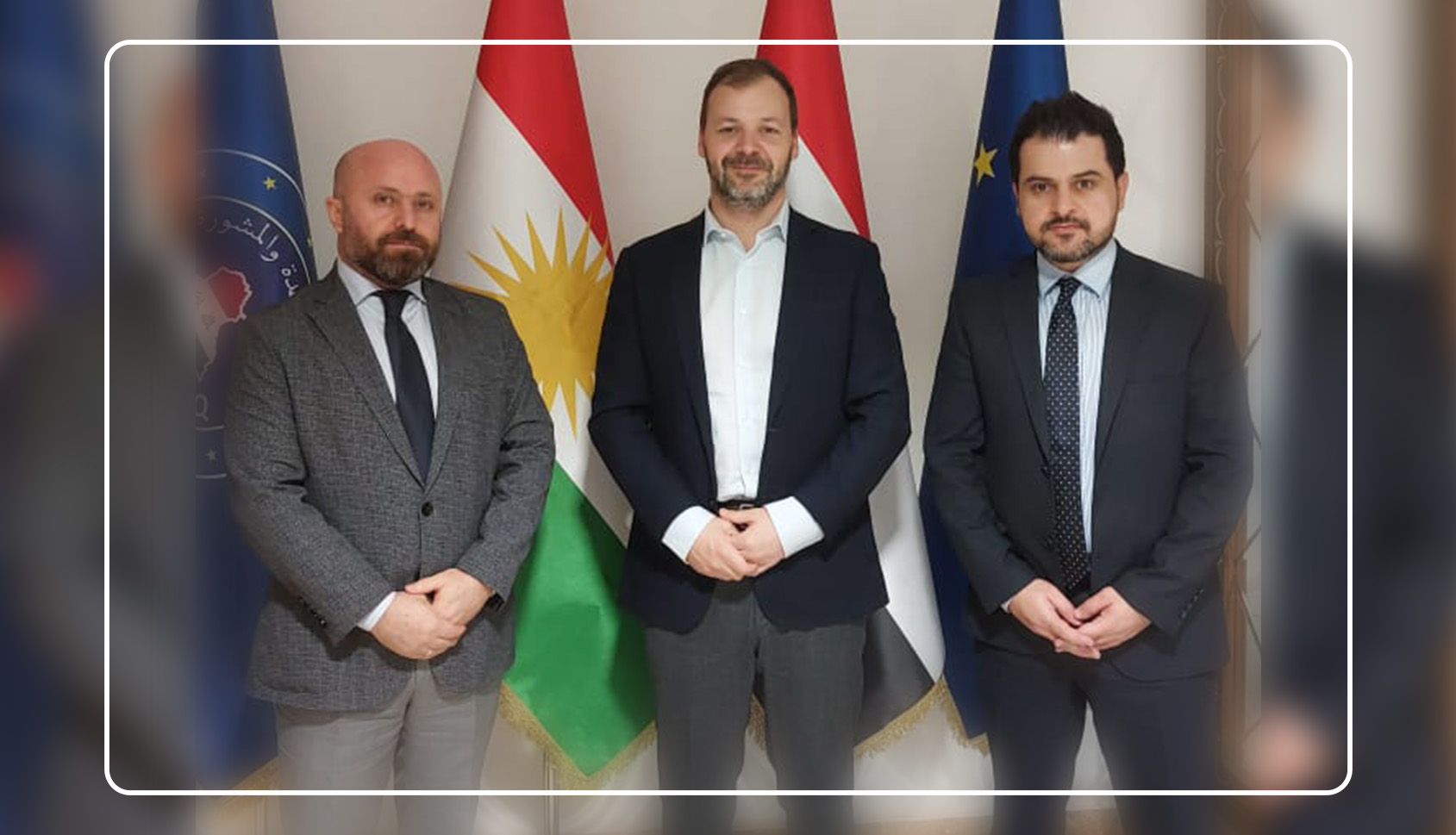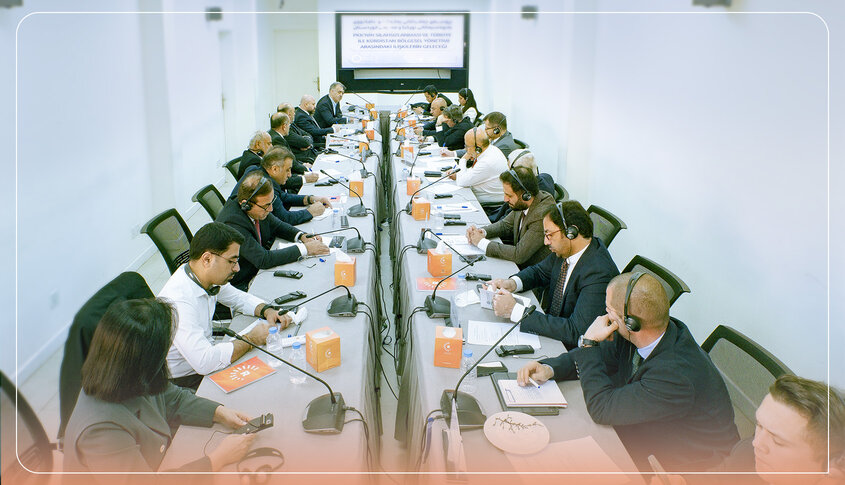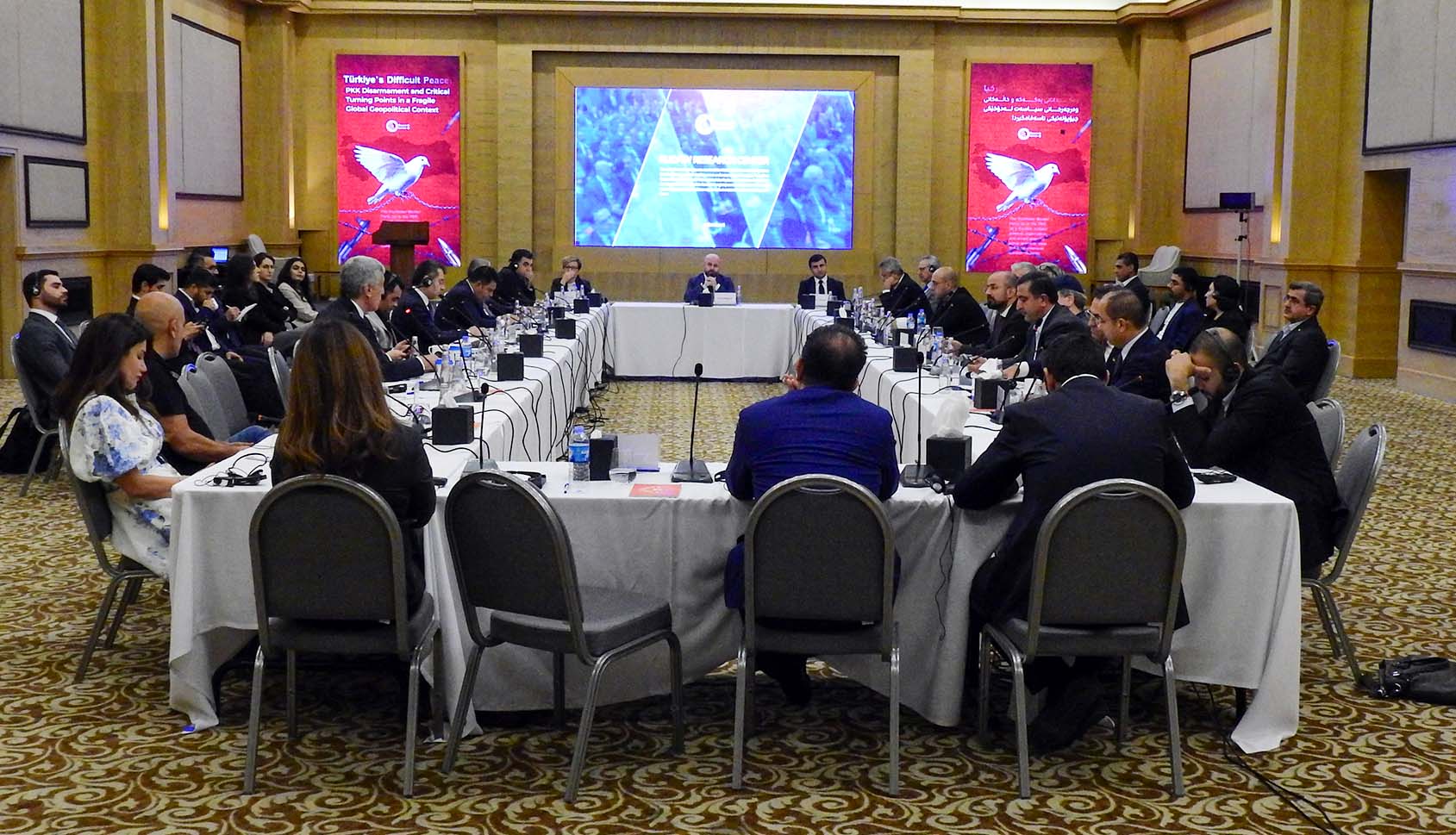Interview 07: Faith and Strategy; Kurdistan Islamic Union's Perspective on the Geopolitical Shifts in the Middle East
12-04-2025
Bestoon Osman: Where did you perform Friday prayer this afternoon, and what was the sermon about, dear?
Salahuddin Bahauddin: In the name of God, the Compassionate, the Merciful. First, thank you—to you, to Rudaw, and to the honorable attendees. Happy Friday to everyone. Happy Ramadan as well; may it be an auspicious beginning.
We performed Friday prayer at the Mother Mosque in the Italian City. The sermon was about preparing oneself for Ramadan and about repentance, which is beneficial for both you and me.
Bestoon Osman: It’s certainly good for me, but I don’t know why it’s good for you.
Salahuddin Bahauddin: Because we often become content with ourselves and assume that what we have done is sufficient. But repentance is necessary for us as well. We all need repentance. The sermon focused on repentance and God’s mercy.
Bestoon Osman: Are you ready for Ramadan, God willing?
Salahuddin Bahauddin: Yes, God willing.
Bestoon Osman: Are you ready for the changes happening in Northern Kurdistan and Turkey? I saw your statement yesterday. My first question is: What role did you play in preparing the groundwork for this process? And second, what role can you play going forward?
Salahuddin Bahauddin: Certainly, that was an important event. But to begin with your question—since the 1990s, when we began visiting Turkey and developing relationships with political parties—especially the Welfare Party (Refah Partisi) and later the Justice and Development Party (AK Parti)—our relationship with them, particularly with those in government, has been positive. We have consistently emphasized certain principles.
We have an issue in the Kurdistan Region; we are familiar with the national struggle and its consequences, the role of armed movements, and how to engage with such groups. We have always emphasized that taking up arms for a cause—even if it is just—should not be the starting point unless it is absolutely necessary. Especially in this era, armed struggle is not a safe beginning, and when the beginning is unsafe, the end may be unsafe as well. After all, no one produces their own weapons—arms come from somewhere.
Whoever supplies weapons inevitably has demands. As a result, when a state or government engages with armed groups—especially those with nationalist motivations—resolving the issue through force is not viable. Whether they are labeled as terrorists or bandits, these are all descriptions and classifications that vary according to the speaker’s perspective. Some may fit those labels; others may not. But what truly matters is that peace must be the foundation. All meaningful progress and nation-building occur in a peaceful environment.
Salahuddin Bahauddin:
I remember something one of our political officials once said—it had a good aspect to it. They were speaking about how we used to blow up bridges, destroy government buildings, and sabotage water pipelines. This was considered activism, a form of struggle. It certainly had an impact on both the culture of the perpetrators and the people living in those areas. And yes, these individuals were often companions of armed groups. Sometimes it’s an act of provocation intended to elicit a response from your opponent. But in the end, this kind of behavior should not become a culture.
One of the problems with our authorities in this region is that even after 30 years, the effects of that period remain. When they came to power, they believed that destruction was still part of the struggle. While that may have been necessary in the beginning to assert one’s presence, if it evolves into a culture, it becomes a disaster. I’ve even discussed this issue in the Turkish media during interviews since the 1990s. I’ve consistently emphasized—also in conversations with officials—that the Kurdish question, as a national issue, is separate from the issue of armed groups demanding Kurdish rights. Whether you agree with them or not, or whether others claim otherwise, these are two different matters. One should not be punished because of the other.
The Kurds are a major nation in this region. They have experienced difficult circumstances and have been divided. Today, they should enjoy full citizenship rights within their own states, along with all other fundamental rights. Whether they make demands or the nature of those demands is another discussion. What I was referring to was historical context, but recently, we’ve entered a period of unexpected developments—what’s happening in Syria, Gaza, and elsewhere is part of that. It seems the situation has either spiraled out of control or is being driven by a deliberate plan to reshape the region through political and military surprises.
We felt that the changes that began particularly in Syria—and earlier in Gaza—are part of something deliberate. It’s like a storm with an unclear origin. What Mr. Bahçeli mentioned was sudden and unexpected. The process is moving forward. Respected members of the party are going to İmralı [prison] and returning, engaging in dialogue and meeting with political parties. This was not the case before—there used to be a completely closed atmosphere, and people were harshly punished for something as simple as having a picture of Öcalan. We have seen and heard about these instances many times. This change is significant for all sides.
It is important that they themselves are taking the initiative, and they should be congratulated for it. On the other hand, as a nation and as armed fighters engaged in a national struggle, we should see this as an opportunity and welcome it. At this point, when they have consulted with us, we have responded positively and have sought to convey constructive messages to all parties.
Bestoon Osman: Have you only spoken positively to Turkey, or to the PKK as well?
Salahuddin Bahauddin: To all of them.
Bestoon Osman: What role can you play now?
Salahuddin Bahauddin: I believe that talk of laying down arms does not mean surrender. While the PKK may interpret it as surrender, the Turkish state promotes that interpretation even more strongly. They have never been willing to recognize any armed actors or negotiate with them—they have consistently labeled them as terrorists. So when some on social media describe this process as surrender, or when they mix up minor issues with this major strategic matter, it is simply wrong.
The people in Qandil need to clearly understand that this is a new phase. The founder and true leader of this movement has been Mr. Öcalan. Öcalan is a political and intellectual figure, and unless he is personally convinced that a particular direction is beneficial, he would not make such proposals. The PKK, more than anyone else, should be insistent that Öcalan's words are not disregarded. They can debate the method, the timing, and the approach—that is natural, and it will certainly take time—but it must happen.
I expect their response to be positive and that they will welcome the message. Of course, implementation and advancing the process will take time and require goodwill from all parties. We should not create unnecessary obstacles to this process. This is politics—it's about understanding and balancing many variables. The region is complex, with many serious threats. In light of all that, they have reached this decision. The Turkish authorities have decided to resolve this issue through peaceful means, and that presents an opportunity. This is extremely important.
Bestoon Osman: Can we play a role as Kurdistan and Iraq?
Salahuddin Bahauddin: Certainly, we can. We are ready, we have been ready, and we remain ready. To be fair, the Kurdish authorities in the Kurdistan Region are also prepared for this matter. The Kurdistan Region and its authorities share the same mindset, principles, and goals regarding our national message to support this process, back it, and provide whatever facilitation is necessary. When it comes to disarmament, there is a difference between laying down arms and having them forcibly taken away. I believe that laying down arms is a personal process based on conviction, equations, and results. Being forcibly disarmed is something imposed by one side on another, and that's not what is happening here.
Bestoon Osman: Does this equation in Öcalan's call also include the YPG and PYD? Mazloum Abdi has said it doesn't include them and that there is no decision to lay down arms.
Salahuddin Bahauddin: Mr. Öcalan belongs to all sides, especially Western Kurdistan, Northern Kurdistan, Qandil, and Qamishlo. They all displayed his picture equally and suffered beatings and pain because of it. Perhaps, we as another political force viewed him as a political figure due to ideological differences, but they see him as a founder, a figure of charisma, and a leader. I respect Mazloum, as he is a hardworking and intelligent man. However, I think it would have been better if he hadn't made that statement. He might have wanted to respond to the stagnation and isolation that occurred in these recent days when a dialogue conference was held in Damascus, and they did not attend. The situation in Syria has not gone in a positive direction. Separating Western Kurdistan from the overall issue isn’t practical, although the timing, extent, and levels may differ. The Syrian issue will be resolved in Syria, and Turkey has influence there, having occupied part of its territory. If you want the peace process to succeed in the north, it would have been necessary—even if Western Kurdistan wasn't directly included—to integrate into the process and state that they took up arms for a cause, and now the situation in Syria has changed…
Bestoon Osman: So, you believe that the PYD and YPG should also respond to Öcalan's message and lay down arms?
Salahuddin Bahauddin: Of course. Accept it, welcome the message, and the details of the procedures are another matter. It requires discussion and negotiation.
Bestoon Osman: At the same time, there are ongoing dialogues between the SDF and Damascus about integrating their forces.
Salahuddin Bahauddin: Yes, this is the way to resolve the issue. Now, Mazloum and the officials of the autonomous administration in Western Kurdistan need to understand what has transpired. They need to understand that this is not the time to discuss separation from Syria. However, the special characteristics of Kurdistan or their region can be preserved without posing a threat to Syria, while also not threatening the peace process. They are important in this peace process; they have relations with Turkey and issues to address with each other. They share borders and have disputes between them. Calming the situation should be the foundation, and we should reduce the threats against each other.
Bestoon Osman: But Turkish parties are demanding their dissolution. Does this include the PYD and YPG?
Salahuddin Bahauddin: That's an unnecessary and negative initiative. It shouldn't be happening because the details should serve the process and the fundamental principles. Excessive focus on details is a mistake. In my opinion, it is a mistake because if that's the objective (for the YPG to lay down arms), then what’s the purpose of all these efforts, all this back-and-forth? Either your vision isn't clear, or you're not fully aware of the issue. We need to calm the atmosphere. Humans are naturally inclined to respond differently when told to lay down their weapons, compared to creating an environment where they no longer feel the need to have weapons.
Bestoon Osman: I feel that a group of Sunni leaders, such as Ismail Haniyeh and Yahya Sinwar, sacrificed themselves to eliminate the Shiite Crescent. Do you see it that way too?
Salahuddin Bahauddin: That’s your interpretation. I don’t see it that way. I believe that what the superpowers—especially America, Russia, and Europe—are working on involves all cards. One of these cards is the Shia-Sunni issue. Perhaps, at one stage, they wanted to elevate the Shia, especially after September 11th and similar events. A wave of fear about Sunnis was created, and gradually it reached certain other steps in Iraq, with effects visible elsewhere. Maybe at another stage, they have changed their approach. In the world of politics, dealing with interests, protecting those interests, and exchanging allies and enemies is not unusual. Power does not stay with one side forever. It's granted as an opportunity, and how long they can manage their situation and their relationships with decision-makers determines how long they last.
Bestoon Osman: Has the era of Shia hegemony in the Middle East ended, and is a new era beginning?
Salahuddin Bahauddin: Right now, at the very least, a kind of retreat is visible, but that doesn’t mean it’s completely over.
Bestoon Osman: Will this retreat reach Baghdad?
Salahuddin Bahauddin: Baghdad is not exempt from this wave. They have started to regroup and work on this. Political insight into these events is important, especially if events dominate the field. Since Iraq is also Iran’s security fence, with Iran being its foundation, they are certainly instructing their supporters to deal more wisely with developments and avoid providing excuses. The silence in Lebanon and the shift in thinking in Iraq are noticeable.
Bestoon Osman: Beirut and Damascus fell as Tehran’s allies with that identity. Will Baghdad fall in the same way?
Salahuddin Bahauddin: Baghdad has unique characteristics because, since 2003, there has been a process of governance change there. The United States and allied countries participated in that process, and a constitution was established. As a result, there are certain measures they won’t resort to until those tools are exhausted. If change succeeds in the elections, we will see different developments. After this storm, prominent figures should withdraw from the political process. Some Sunni figures will emerge, and the Kurds need to put their house in order so that their presence in Baghdad is natural.
Bestoon Osman: In the Shia world, when discussing Shia hegemony, there is one authority led by Iran. Who will lead the re-strengthening of the Sunni current?
Salahuddin Bahauddin: Sunnis don’t have a single religious authority. They don’t practice "Sunnism" in a unified way, nor do they capitalize on their Sunni identity, which has allowed Israel's security to prevail above all else. Sunnis are divided and each aligned with a different state. While the Shia have practiced sectarianism, the Sunnis have not.
Bestoon Osman: Can Turkey play that leadership role?
Salahuddin Bahauddin: Turkey is a historic state with a 600-year legacy, and it has a determined leader. Whether people accept him or not is another matter, but President Erdogan is an important figure. He also faces internal challenges, with little unity or consensus. However, Israel’s security is a foundational element in the relationship between Europe and the Middle East, meaning that, ultimately, any relationship will have Israel’s security as a central point.
Bestoon Osman: Iran’s withdrawal from the region, rather than creating Sunni hegemony, is instead leaving the field to Israel.
Salahuddin Bahauddin: Israel, in the sense of America’s and the West’s allies, is being used as an excuse, but a closer relationship is being built with these allies to establish stability in the region. Additionally, bringing back some of the Sunnis who do not practice sectarianism could help create a kind of stability, even if it’s temporary.
Bestoon Osman: Specifically regarding Syria, there is a Sunni Islamic force that is far from your approach, but they are politically Sunni.
Salahuddin Bahauddin: In 1979, when the Iranian Revolution happened, the Afghan revolution also took place. Pakistan and Saudi Arabia, at America’s command, supported that revolution. Later, when things progressed and the Russians were defeated, these forces were swept aside and the Taliban was brought in. After some time under their rule, problems arose, and they were removed. Then, after years of war, the Taliban was brought back. This is about politics, which also answers many other questions. Now, there is an understanding, and the situation has changed. The same thing is happening in Syria. Those who rule Syria now previously had different ideas, but a kind of mutual understanding has developed, and the situation has shifted. Russia, exhausted by the war in Ukraine, has also been drawn into this situation in Syria and wanted to leave with some kind of agreement. After Lebanon and other places, Syria became a burden for Iran. Assad wouldn’t listen to anyone, so they left him too. These are Sunnis, but to what extent can they practice sectarianism there? The sectarian movement within Sunnis is weak.
Bestoon Osman: "However, it's an opportunity for the Kurds that can be utilized, due to personalities and political parties like yourself, because you can create a common language with Ahmed Shara and his friends. Do you think you can use that beneficial language?"
Salahuddin Bahauddin: "You know, let our own relatives not be afraid first. Let our own parties not fear that the Islamic days are approaching, in the sense that we are included. No, we’re here, and we’re humble in our own way. Certainly, the Islamic message doesn’t have just one approach. There are armed and unarmed versions, and all kinds. But the fear that has been created around the Islamic movement, viewed as a phobia, is gradually creating an understanding that it’s not like that. Look at Ahmed Shara; he’s more understanding and softer than everyone else."
Bestoon Osman: "How much should we believe these words? Can a person change overnight from extremism to moderation like this?"
Salahaddin Bahauddin: "Humans are moving beings, and their thoughts evolve too. I believe change is possible, as we’ve seen in Egypt before. When reason and logic prevail, extremists cannot tolerate it, but the wise find the correct path. Ahmed Shara is like that too, and there’s hope that he’ll continue. I don't know him personally, but we have plans to move toward Syria, where Islamists have a presence, and from there, we aim to reach the autonomous region and address the misunderstanding between the PYD and Damascus."
Bestoon Osman: "In Kurdistan and Iraq, the Baathists represented the Sunni movement. After the fall of Saddam, we saw significant changes among the existing forces. Now we have two Sunni poles—Khamis Khanjar and Mohammed al-Halbousi. Can they play the role that the Sunni movement once held?"
Salahaddin Bahauddin: "They are certainly Sunni in terms of composition and sectarian affiliation, but how much have they been able to win the hearts of Sunni areas, especially given the obstacles many Shiites have posed? They themselves have suffered from corruption and other issues, which have diminished their credibility."
Bestoon Osman: "We are neighbors to Sunni Arabs. How can we leverage our Sunni identity to reach an understanding with those living in our disputed territories who are also Sunni?"
Salahaddin Bahauddin: "First, we need to eliminate the tension between the general Islamic movement and the secular Kurdish entities, as this creates confusion about the capabilities of our forces. We have our own record—Baath had both Sunnis and Shiites within it. Baath was a dictatorial system, and if we start fighting based on former Baathist affiliations, that matter should be addressed by the courts."
Bestoon Osman: "Do we see the risk of Baath members and supporters returning to the political scene?"
Salahaddin Bahauddin: "Anyone who plays this card is doing so deliberately. The desire regarding the Baath party, part of which is historical and part of which is manufactured, remains for competitive purposes. Even if it returns, it won’t necessarily practice Baathism; it might adopt a Sunni agenda. There's a possibility that former Baathists will be used for a Sunni state presence. In any case, what’s dangerous for us as Kurds is the fear that we won’t be able to engage with this Sunni movement due to our internal disarray, which has become an obstacle to many of the steps we need to take."
Bestoon Osman: "The President of the Patriotic Union of Kurdistan (PUK) proposed last week in Baghdad that all Kurdish parties participate with a unified list in the Iraqi parliamentary elections. The President of the Kurdistan Region also said, 'I welcome such an idea.' What do you think?"
Salahaddin Bahauddin: "Both of them are in power, so this might be part of their ongoing political maneuvering, which is understandable, and the principle itself is sound. When Kurds have been united internally, they’ve been able to protect their achievements. However, the internal power struggle in Kurdistan might prevent this from happening. We need to create a surprise, and that should be led by the ruling party."
Bestoon Osman: "In your rhetoric, you were intense. The first surprise from the Kurdistan Islamic Union (KIU) was your increase in seats. Later, when you gave your speech, you said, 'Enough is enough.' On social media, your video was posted with comments claiming the 'dark force' of the Union has moved, and your statements seemed to suggest a shift toward confrontation."
Salahaddin Bahauddin: "I still stand by 'Enough is enough,' and I say that frankly, without reservation. I’ve made it clear who I’m addressing. I speak in the public interest, but I might not be cautious about addressing specific personalities, especially since we are also in opposition. However, there has been no violation of boundaries. There has been a loss of control, but we remain committed to our principles of moderation. Still, we are dissatisfied with the performance of this administration."
Bestoon Osman: "For Iraq, if a consensus forms, and they say, 'Come, let’s create a unified list together,' is the Kurdistan Islamic Union (KIU) ready to participate?"
Salahaddin Bahauddin: "It’s still early for that, but we’ve done it before, and it’s not impossible. In principle, unity and solidarity in the face of challenges—this is a principle we believe in."
Bestoon Osman: "Why don’t we invoke God’s name on this, Master? Mr. Bafel made this initiative in Baghdad, and Mr. Nechirvan said, 'Why not?' here. Perhaps you could also say 'Why not?' and maybe, under the shadow of current events, everyone could come together and participate with a unified list."
Salahaddin Bahauddin: "No, I won’t do that because I am not just in power. We have institutions and accountability to consider."
Bestoon Osman: Is there any possibility of you being active as an opposition party in the next parliamentary term?
Salahaddin Bahauddin: Part of the groundwork we must focus on is preparing ourselves and exploring possibilities. The Parliament has not yet determined its presidency, but what’s concerning is the lack of trust between citizens and the authorities, as well as among the political parties. These issues need to be addressed, and some of them will take time to resolve.
Bestoon Osman: Is there any possibility for the opposition parties to form a united front?
Salahaddin Bahauddin: That question takes us into an area of evaluation, so I’d prefer not to go into specifics about how much we are in opposition or how much we are part of the nation. We always express positive sentiments toward the ruling powers from this position to prevent any misunderstandings, both on their part and ours, because there are numerous challenges to address.
Questions from the Audience:
First Question: The Islamic Union has energetic and capable youth. Isn't it time to move toward participating in the government or becoming a partner in the government?
Salahaddin Bahauddin: Thank you. I believe we are 31 years old now, and we have tried all approaches. The Kurdistan authorities have a unique style; they have not only failed to improve but have deteriorated, working in a manner that excludes other parties. We have not insisted on entering that authority; we believe we are more effective as an opposition. We do not favor participating in the government because doing so would mean becoming part of what they have created.
Second Question: Does Master Salahaddin guarantee that if Western Kurds lay down their arms, Damascus will grant us our rights?
Salahaddin Bahauddin: This concern is valid, but we must understand the reality. They themselves are armed and have already laid down their weapons; they want arms to be in the hands of the state. In the autonomous region, America is present and can guarantee their protection without abandoning them. Regarding their political reasoning, we often criticize the KDP and PUK, but during their time in 2003, they were united, established Kurdish rights in Baghdad, and performed well in that phase. Now, they too must establish their rights in Damascus.
Third Question: You mentioned that Mazlum Abdi has isolated himself and did not attend the National Dialogue Congress. America is present and can guarantee the rights of the Autonomous Administration. The spokesperson for the Congress stated that the SDF is not part of this Congress because it has armed forces; the SDF, however, said, “We were not invited.” The ENKS, which represented the Kurds and had support from Turkey, was also not invited. You have good relations with Qatar, which played a role in Ahmad Sharaa’s success. What can you do for the Kurds?
Salahaddin Bahauddin: We all need to try and utilize our connections. The fear of Sunnis and Islamists is significant; we must address this and use our relations with other countries. It was not a good decision to exclude them, and that action was not positive. However, they need to reassess their perspective; the call for dialogue needs to be adjusted now. The discourse Turkey had before the existence of autonomy is a separate matter, but it must change because the reality on the ground is different today.

